#house of beauharnais
Text

Queen Josefina of Sweden and Norway by Sophie Adlersparre (oil on canvas, 1856)
Joséphine Maximiliana Eugenia Napoleona of Leuchtenberg was born in March 1807 in Milan, the daughter of a French general.
On 23 August 1822, Crown Prince Oskar came on a visit to Eichstätt in Bavaria, where he met Joséphine. The Crown Prince fell in love with her, and asked for her hand in marriage a few days later.
On 19 June 1823, her Swedish marriage ceremony took place at Stockholm Cathedral. Her official name became Josefina.
Josefina contributed towards the construction of the first Catholic church in Stockholm in 1837, and towards establishing the Catholic congregations in Gothenburg and Kristiania. She established and supported many philanthropic associations, including the Josephinahemmet home in Blackeberg, Stockholm, and she worked hard to help poor mothers and widows with children.
When Oskar ascended to the throne in 1844, Josefina gained increased political influence. She was the king's only truly loyal advisor.
Photo: royalpalaces.se
#swedish royal family#queen josefina#duchess of södermanland#joséphine de leuchtenberg#joséphine of leuchtenberg#princesse joséphine de leuchtenberg#princess joséphine of leuchtenberg#house of beauharnais#art history#official portrait#swedish royalty#swedish history#royal history
9 notes
·
View notes
Note
hello! speaking of eugène, do you know if sisi ever kept in touch with or referenced her beauharnais cousins, like the bernadottes or leuchtenbergs? do we know what she thought of them (if she did at all)?
Hello! This is something that I've also been wondering for a while. They did met sometimes with the Bernadottes, but I don't know if they treated each other as cousins. In Valerie's diary I found two mentions of them, first in 1885 in a letter of Franz Josef to Valerie about a visit of King Oscar II of Sweden (Josephine of Leuchtenberg's son and therefore Elisabeth and FJ's first cousin once removed). However I have no idea what the letter said because Richard Sexau, the guy that transcribed the diary in which the published edition is based off, decided to not transcribe it. The second mention is from 1886, when Valerie and Elisabeth were in Baden and met the Crown Prince Gustaf of Sweden (future Gustaf V, and grandson of Josephine of Leuchteberg) and his wife Crown Princess Victoria. The Crown Prince and Princess hanged out with them, Duchess Mathilde (Sisi's sister), and her daughter Maria Theresa "Mädi", whom apparently was close friends with Victoria (Valerie calls her "Mädi's beloved Viki" and also notes that she's very likeable). This is all I could find, but there probably is more.
I don't know about Elisabeth, but Archduke Max did kept contact with Empress Amelie of Brazil (Auguste and Eugène's daughter) even after Princess Maria Amelia (his fianceé) died. He visited her often, and I'm pretty sure they mentioned in each other's wills. Also I read in a biography of him that when he was Viceroy of Lombardy-Venice he tried to imitate Eugène, but I'm not sure how accurate this is.
About the rest of the Leuchtenbergs: Auguste, 2nd Duke of Leuchtenberg married Maria II of Portugal in 1834 but died shortly after without issue. His brother Maximilian, 3rd Duke of Leuchtenberg married Emperor Nicholas I's daughter Grand Duchess Maria Nikolayevna and moved to Russia, and for what I gathered eventually this branch loss all its connections to Bavaria. Eugénie (who was present at Sisi's birth and was one of her namesakes) married a prince of Hohenzollern; they visited Munich many times so maybe she met Sisi when she was more grown up, but she died in 1847 and had no children. And lastly Theodolinde, the youngest surviving daughter, married the future Wilhelm, 1st Duke of Urach, had four daughters and died in 1857. I know nothing more about this branch, but fun fact: Duke Wilhelm remarried and had a son, who later married Duchess Amelie in Bavaria, a niece of Empress Elisabeth.
#i would guess that the habsburgs did not treat the bernadottes as cousins because they were *gasps* protestants#but who knows maybe they did. no matter how intermarried your catholic dynasty is you WILL have a protestant cousin eventually#empress elisabeth of austria#archduchess marie valerie of austria#franz josef i of austria#empress amelie of brazil#maximilian i of mexico#oscar ii of sweden#gustaf v of sweden#queen victoria of sweden#house of bernadotte#house of beauharnais#asks
17 notes
·
View notes
Text
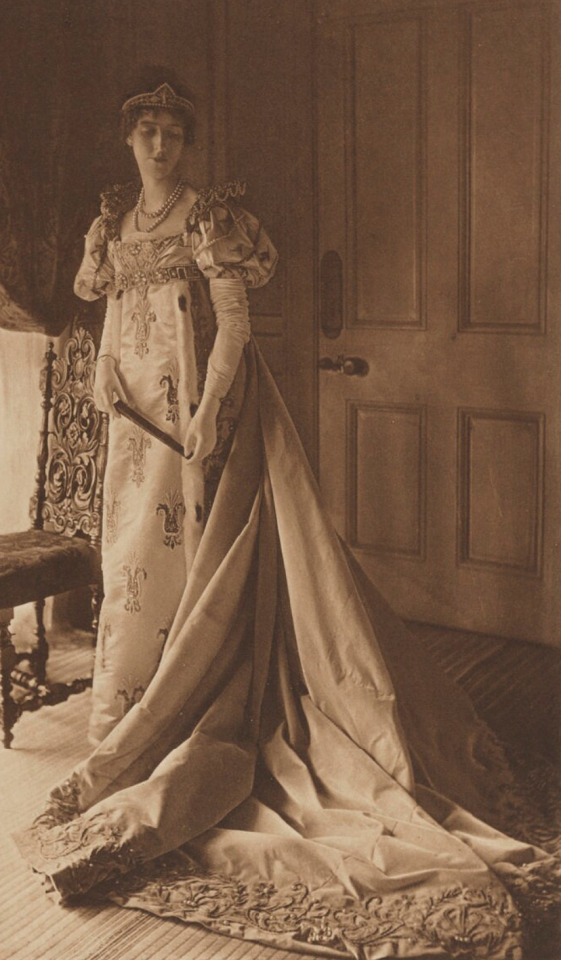
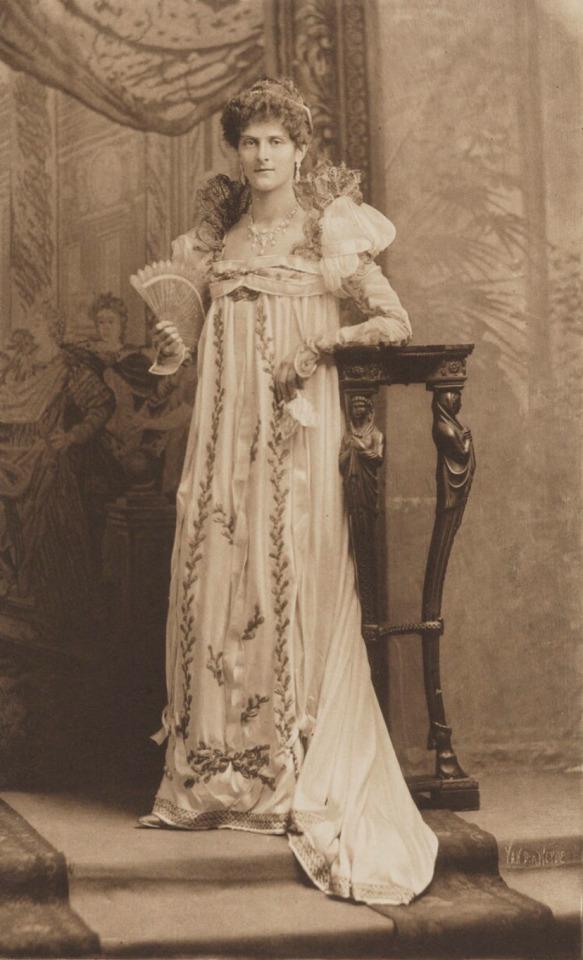
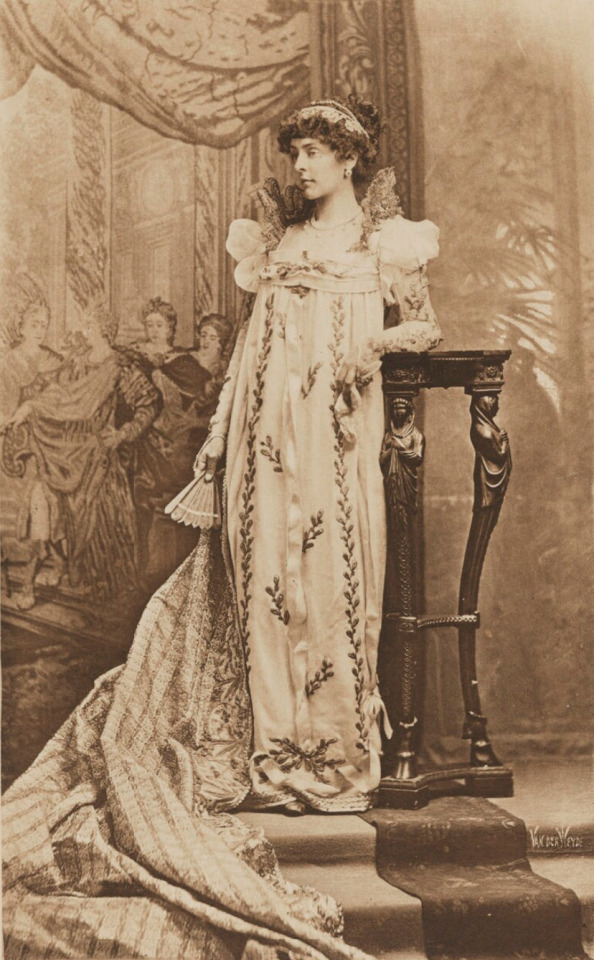

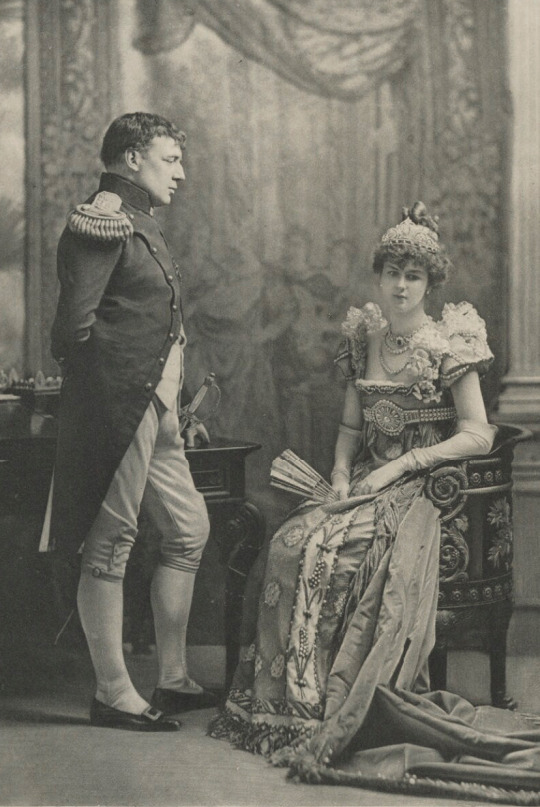

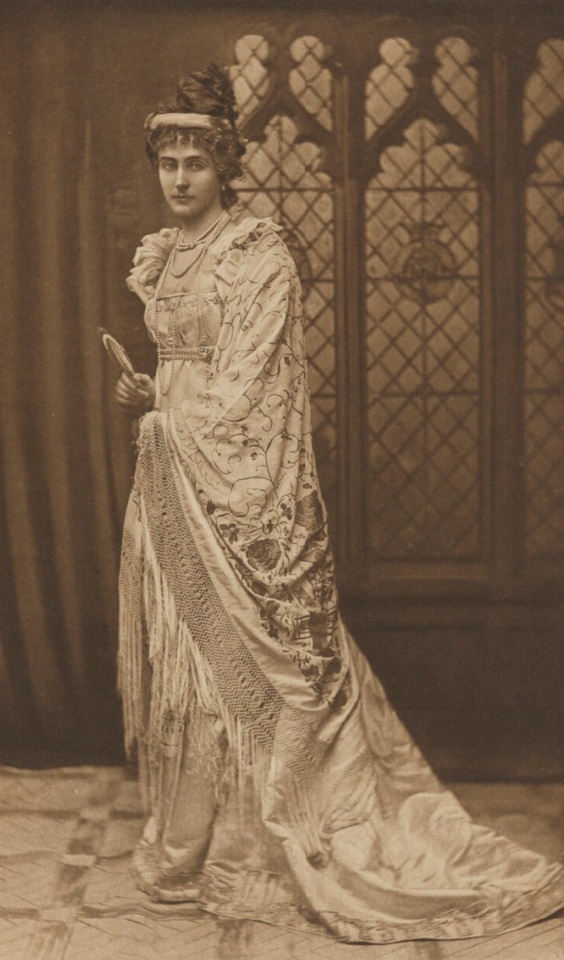

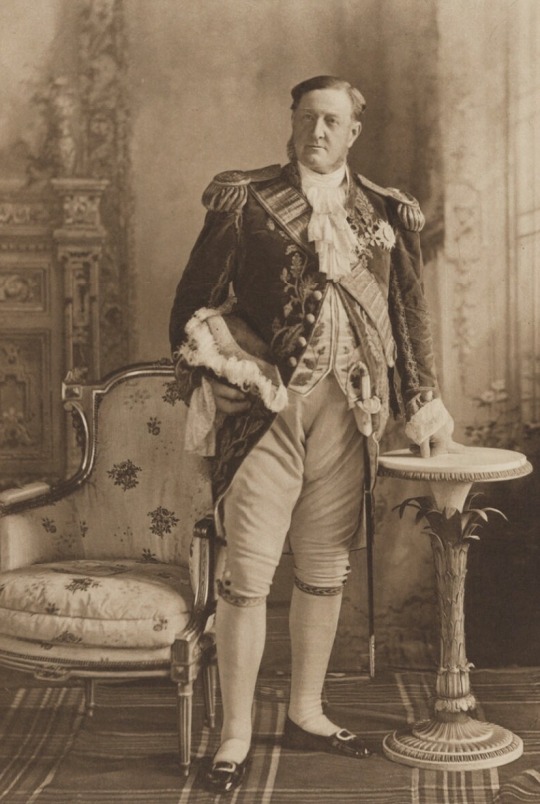

Costumes of Napoleonic figures at the Devonshire House Ball of 1897
1. Aileen May (née Wyndham-Quin), Countess of Meath as Hortense de Beauharnais, Queen of Holland
2. Princess of Löwenstein-Wertheim-Rosenberg (née Countess Josephine Kinsky) as Princess Pauline Bonaparte Borghese
3. Thérèse (née Kinsky), Countess Clary-Aldringen as Caroline Bonaparte Murat, Queen of Naples
4. Florence Anne (née Cole), Lady Delamere as Hortense de Beauharnais
5. Sir Charles Edward Cradock-Hartopp, 5th Bt as Napoleon I; Millicent Florence Eleanor (née Wilson), Lady Cradock-Hartopp (later Countess Cowley and Mrs Duberly) as the Empress Josephine
6. Lord Arthur Vincent Hay; William George Montagu Hay, 11th Marquess of Tweeddale; Candida Louise, Marchioness of Tweeddale as the Empress Josephine
7. Kathleen (née Douglas-Pennant), Viscountess Falmouth as Madame Recamier
8. Maria Henrietta Sophia Chaine (née Phipps) as Madame Sans Gêne
9. Henry Chaplin, 1st Viscount Chaplin as Marshal Lefevre
10. Catherine Dorothea Mary Grosvenor (née Simeon) as Marie Louise
#Devonshire House Ball of 1897#Devonshire Ball of 1897#ball#1890s#1897#napoleonic era#napoleonic#napoleon bonaparte#first french empire#french empire#Hortense de Beauharnais#pauline bonaparte#Caroline Bonaparte#josephine bonaparte#Marie Louise#Madame Recamier#Marshal Lefevre#costumes#costume#fashion history#historical fashion#Napoleon#Madame Sans Gêne#19th century#france#history#Devonshire#England#empire#empire style
91 notes
·
View notes
Text

“It's neat (and very fitting) that in the American Horror Story Universe they say Empress Joséphine, the G.Duchess Anastasia, and the Tudor princesses were witches. 🤔” - Submitted by Anonymous
16 notes
·
View notes
Photo

Hortense Eugénie Cécile Bonaparte (10 April 1783 – 5 October 1837) was Queen consort of Holland. She was the stepdaughter of Emperor Napoléon I as the daughter of his first wife, Joséphine de Beauharnais. Hortense later married Napoléon I’s brother, Louis Bonaparte, who had been made King of Holland, making her the sister-in-law to her step-father. She was the mother of Napoléon III, Emperor of the French; Louis II of Holland; and Napoléon Louis Charles Bonaparte who died at the age of four. She had also an illegitimate son, Charles, Duke of Morny, by her lover, the Comte de Flahaut.
#Hortense de Beauharnais#House Beauharnais#XVIII century#XIX century#people#portrait#paintings#art#arte
5 notes
·
View notes
Text



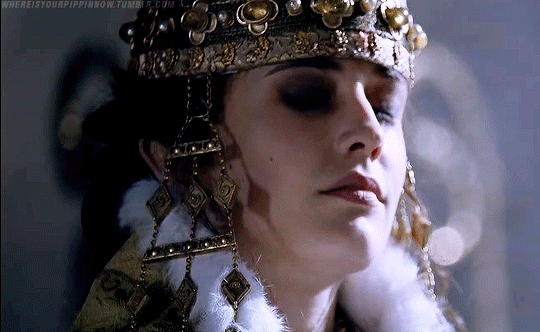
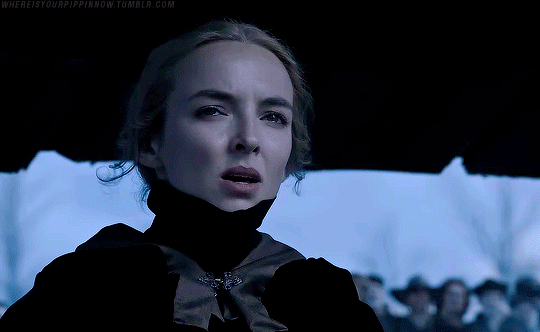

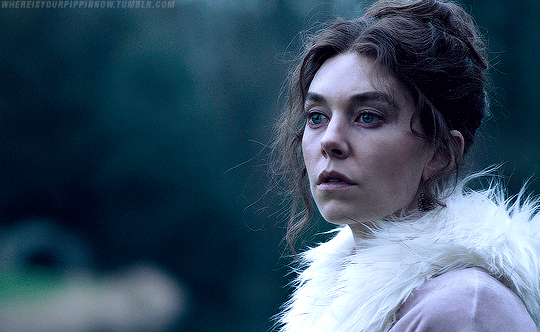
Female leads in Rildey Scott films » for Anon
Sigourney Weaver as Ellen Ripley | Alien (1979)
Connie Nielsen as Lucilla | Gladiator (2000)
Julianne Moore as Clarice Starling | Hannibal (2001)
Eva Green as Sibylla of Jerusalem | Kingdom of Heaven (2005)
Jodie Comer as Marguerite de Carrouges | The Last Duel (2021)
Lady Gaga as Patrizia Reggiani | House of Gucci (2021)
Vanessa Kirby as Joséphine de Beauharnais | Napoleon (2023)
#filmgifs#filmedit#moviegifs#filmdaily#tvandfilmdaily#dailytvfilmgifs#dailyflicks#cinemapix#ridley scott#moje#requests#request
38 notes
·
View notes
Note
Hello! What was Eugene and Hortense’s relationship with Napoleon like? Sometimes Naps seems to give off a bit of “evil stepparent” vibes yet sometimes he seems to be decent so I can only imagine that it’s complicated (I would know, I have stepparents).
And full of dysfunctional family drama, naturally!
(Someone should make a Napoleonic soap opera.)
Anyway, thanks in advance!
P. S.

Thank you so very much, both for the question and the love - and right back at you 💖. I know I've really taken my time with this one but I wanted to find the correct quote which took longer than I thought. (I had no clue Roederer wrote so much.)
First of all: No, Napoleon is not the prodigal evil stepfather, far from it. On first glance, he even seems like the ideal stepfather, immediately taking to the two children, for the sole reason that they were related to Josephine, and despite the children’s initial animosity against this new addition to the family. Hortense in particular makes it very clear in her memoirs that she feared her mother would love them less once she had a new husband, whereas Eugène saw his mother’s second marriage as »a desecration of my father’s memory«. Both are probably very normal and common reactions; I particularly understand the kids’ fear of having to share their mother’s butterfly attention with yet another person. (Josephine often barely remembered them anyway.)
It is also unclear to me how well they actually knew this general Bonaparte before he and Josephine married. The story of Eugène and the sword/sabre of general Beauharnais is well-known, and Hortense in her memoirs tells the story of how she, at a dinner in Barras’ house, was sitting between Josephine and Napoleon, who totally ignored her, talking only with her mother. Other than that, Napoleon must have visited often, but most of the time the kids would have been at school at those occasions. And they apparently only learned about their mothers’ second marriage after the fact, through Madame Campan, who informed them of it. At the time of their mother’s marriage, this general may have been mostly a stranger to them, and in a way, he may have always remained just that.
But Napoleon made every effort to overcome the children’s reserve, and he mostly succeeded. Both children were docile and well-behaved as a rule und would, if not enthusiastically, then at least politely adapt to these new circumstances. Which for Napoleon may have been a nice change compared to dealing with his unruly family, who was giving him hell for having dared to marry without anyone’s consent. During the first Italian campaign, in his letters to Josephine, Napoleon mentions several times that her children had written to him or that he was going to send them presents. (He could not know that at least Hortense, according to her memoirs, had been coerced by Madame Campan into writing. I believe we even have Napoleon’s answer, which is held in a very amused, teasing tone.)
Things would continue in the same vein. We have Napoleon’s letters to Eugène in Egypt (»Stay in the tent, march with the artillery … don’t you dare get yourself killed, kid!«), we have Napoleon discussing Josephine’s supposed infidelities with her teenage son (Eugène probably: »Uhm, general … you do remember that I’m only seventeen? And your wife’s son? You do? Good. Just making sure.«), we have the famous scene of Josephine and her kids, begging on their knees in front of Napoleon’s bedroom door after the return from Egypt and, in one version, Napoleon explaining that he took Josephine back because he had grown so attached to Eugène that he could not bear to see the boy leave. (Though it is doubtful how much of this scene was even meant in earnest, or how Napoleon could have expected Eugène to stay with him rather than with his mother.) We have delightfully normal and funny family correspondence during the Consulate and the early Empire (»Your fat son has arrived yesterday«, »I don’t hear more of Hortense as if she were in Congo, I have to write and scold her«, »your brother is courting all the ladies of Boulogne and still not getting lucky«), and after Eugène’s marriage Napoleon resolutely demands updates on eventual first marital squabbles and even tries to set up Eugène’s daily schedule in a way for him to get enough repose and quality time with the vice-queen.
As to the material and financial side, Napoleon could not have treated his stepchildren any better. Both received wealth, honours and positions they never could have dreamt of (and probably never would have dreamt of) without Napoleon’s influence. But that already takes us to the other side of the coin. At this point I always have to think of the sentence that Lannes once wrote in a letter, in essence: »The emperor loves on a whim, which means: when he has need of you.« - Napoleon’s stepchildren had a function in his political plans, and he loved them as long as they fulfilled their tasks. And once these plans changed and they became bothersome, he did not hesitate to demand back what he had given to them (Italy from Eugène, Holland from Hortense’s son).
But there is a caveat even to the emotional part. As I’ve often mentioned already, while Napoleon called his stepchildren »tu« in private conversation, he treated them as »vous« in court and in all his correspondence. As to the other side, even in their letters to each other or to their mother, Hortense and Eugène always call him »Bonaparte« or »the emperor«. I have not come across any of them calling him, or referring to him as, their father (which is why I hate such references in novels or movies). Eugène in his memoirs keeps mentioning the enormous respect he always had, and as late as the Russian campaign a witness like Dedem van de Geldern had the impression that Eugène »was afraid of the emperor like a child«. There seems to always have been a notable emotional distance between Napoleon and everybody else.
But I feel like the most obvious indication of how unhealthy this family relationship was can be found in Napoleon’s conversation with Roederer in 1804 (?, at least I think it happened during that time, while his family was trying to convince him to divorce Josephine before the coronation and to not make her empress – for which, admittedly, there were excellent reasons). Napoleon says, speaking of his brothers:
They are jealous of my wife, of Eugène, of Hortense, of everyone about me. Well, my wife has diamonds and debts, that is it. Eugène does not have 20,000 livres of income. I love these children, because they are always eager to please me. If there's a cannon shot, Eugene will be the one to find out what it is. If I have a ditch to cross, it's he who gives me his hand. […] [And again about his siblings] They say that my wife is dishonest, and that the eagerness of her children is calculated. Well, I do want this; they treat me like an old uncle; this always makes my life sweet; I am getting old: I am thirty-six, I want some rest.
[Taken from: Pierre-Louis Roederer, »Mémoires sur la Révolution, le Consulat et l’Empire, 5th edition, page 207f. Emphasis by me]
In other words, Napoleon agrees that the sentiments his wife and stepchildren show him are fake and most likely rooted solely in self-interest. He just doesn’t care. He does not claim »You are wrong, my stepchildren do love me.« His answer rather comes down to: »At least they make the effort to pretend they care for me. You guys can’t even be bothered to do that much!«
Which does not strike me as a particularly healthy basis for a family.
But as I’ve already said, I’m still very much learning, and I’m pretty sure there’s still much to find out about the details in this patchwork family.
I hope this does answer your question at least somewhat. Thank you once more for the Ask, and sorry the answer took so long! 💖
43 notes
·
View notes
Text


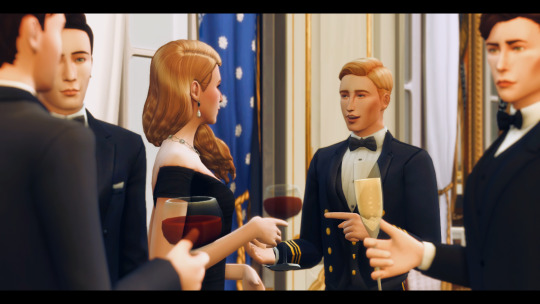
Caroline: Well, it looks like Charlotte got some attention
Philippe: She wants to be with Louis?
Caroline: Who wouldn't?
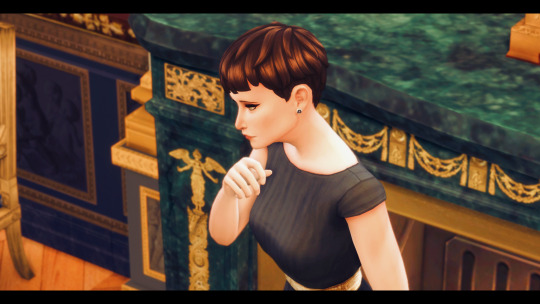
Laura: I didn't know Louis had feelings for her
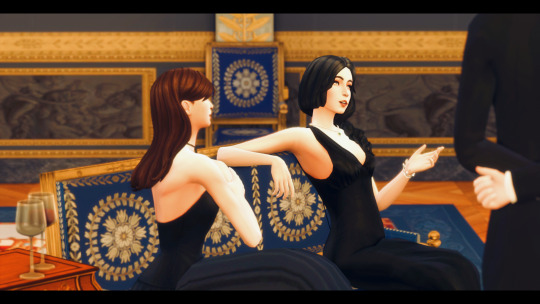

Caroline: Charlotte is a beautiful blonde with green eyes, and a Mortemart, an old French noble family
Philippe: It's a House of the XIIIth century yes
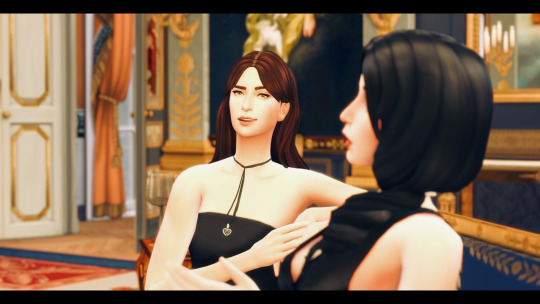
Marianne: You're sweating jealousy, Caro, relax
Caroline: Not at all!


⚜ Le Cabinet Noir | Hôtel Beauharnais, 1 Floréal An 230
Beginning ▬ Previous ▬ Next
Caroline : Tiens, on dirait que Charlotte a eu de l'attention
Philippe : Elle veut sortir avec Louis ?
Caroline : Qui ne le voudrait pas ?
Laura : Je ne savais pas que Louis avait des sentiments pour elle
Caroline : Charlotte est une belle blonde aux yeux verts, et une Mortemart, une vieille famille de la noblesse française
Philippe : C'est une Maison du XIIIe siècle oui
Marianne : Tu transpires de jalousie, Caro, détends-toi
Caroline : Pas du tout!
#simparte#gen 2#sim : louis#sim : marianne#sim : laura#sim : caroline#sim : charlotte#sim : philippevictor#le cabinet noir#sims 4#ts4#sims 4 royal story#sims 4 royal#sims 4 royalty#ts4 royalty#ts4 royal#ts4 royal simblr#ts4 royal legacy#ts4 royal family
33 notes
·
View notes
Text

Name: Eugénie Hortense Auguste Beauharnais.
Nickname: Hortense.
Age: 17.
Birthday: 24 May.
Gender: Femenine.
Pronouns: She/her.
Sexuality: Pansexual.
Height: 1,66.
Ethnicity: British and German.
Race: Whithe British.
Blood status: Pure-blood.
House: Ravenclaw.
Accent: British.
Language: English and German.
Hometown: Godric's Hollow.
8 notes
·
View notes
Text
9—17: NOVEL.
adjective: new or unusual in an interesting way.
rating: t
characters: original characters, euphemie de dansereau, ambroisin de beauharnais, prince haldrath (mentioned)
tags: post-heavensward, ishgard restoration, reincarnation au (for hal), family, politics (?), ‘m gonna marry him’ ‘did i give you any indication that i cared’
summary: she could be better at the art of persuasion.
wordcount: 686
“he’s already asked mummy for her blessing and she accepted. seeing as you’re already here…” her head tilted as if in tandem with the implications of her suggestion.
ambroisin scoffed, turning to look at the oil painting mounted on the wall to the left.
“as if anything i say will stop you.”
her mouth spread wide with pearl-white teeth, though she knew him to be one of the few immune to her charms; even in her girlhood she could never remember the man smiling at her, but then again, she never recalled him smiling at anyone.
“then we understand each other.”
“i know you full well.” he answered instantly, clearly marking her words as only half true.
“the late baron, through and through.”
euphemie had always perceived any comparison to her beloved father as a compliment, but even she could sense his words dripping with disdain—and believed her uncle meant it as something else.
she couldn't remember the last time she met her uncle up close-a delicate but rigid jaw, just like her mother, and the same star silver eyes that all three of them shared, though his were far, far sharper. she supposed it helped, then, with those he'd called to 'question’—though she suspected there were far, far fewer of his quarry.
she wondered if he felt as restless as she did.
“that…and much more.” she raised her head higher as she spoke. to house dansereau, and the rest of the knighthood, they had been reared to the sword, the bow, the shield as if victory was always assured—and it would be, even if it meant that it only existed in halone’s halls. there must have been only a fanatical few who truly believed that the war would actually end in their time—and fewer still who thought it would end in the way it did. euphemie had slowly come to accept that there would be much more needed of her in order to see the peacetime—the thriving—come to fruition, though clearly there were others far slower than she.
now baroness, euphemie steeled herself into becoming house dansereau—and house dansereau would become her. but half of her blood held the beauharnais, and by her mother’s lineage should anything befall them, there would be collateral damage on the dansereaus as well—and she would make her thoughts on such a possibility very well known to him.
“never did i say that the captain would make an ill-fit suitor. if anything i pity the man.” ambroisin faced her in full again, the sharp cut of his bangs only cutting a harsher stare in his niece’s direction.
“and i pity any man who isn’t him.” her smile widened, dimples to cheeks rounding so that her eyes became more brilliant as a counterattack.
“you’re insufferable.” he sighed, though his shoulders hadn’t sunk and his gaze hadn’t dulled. it was hardly a defeat in the way she knew it to be. but ambroisin confirmed her thoughts to one thing: there was no need to worry on how well haldrath would be taken in by the family. at least that skirmish had been won, and he must have thought the same, seeing as he’d started to make his leave from her office.
“send your mother my regards—”
“i don’t want to be enemies with you, uncle.”
he paused, back turned to her, the azure of his inquisitor’s robes caught in the warm lighting.
euphemie remained standing between her chair and the desk—going any closer felt like rushing it. too much, too soon. she had to swallow much of her pride to do this, too, but not all of it. haldrath had encouraged as much the last night they spent in his bed, the last night he spent in his apartment.
“...i know we’ve our differences. but i can’t see how anything would be better for either of our houses if we were to be opposing one another on every matter.”
“as houses we agree on many things.” he spoke, his back still turned to her.
“though as the head of your own you ought to start thinking in ways beyond that of battle.”
2 notes
·
View notes
Photo

To all those who meet and know her, the Queen of Saxony is a most charming personality, her bright, sunny nature, her kind heart, and her exquisite tact, making her loved and respected by all those who have the honour of her acquaintance; and to those who are privileged to hold daily intercourse with Her Majesty, she has become the ideal of all they hold pure and good in womankind.
Queen Carola is the last direct descendant of the Swedish Royal House of Holstein-Gottorp; her father was the son of King Gustave IV of Sweden, and her grandmother was Stephanie de Beauharnais, the adopted daughter of Napoleon I, who had received the title of Imperial Highness and the rank of a princess from the Emperor, and who married the Grand Duke of Baden.
Princess Carola was born at the Castle of Schonbrunn, near Vienna, not quite three years after the marriage of her parents; and it was in Austria, and partly at Vienna, that the Princess spent her happy youth amongst the kind Austrian friends, who did all in their power to help Prince Gustave to forge the ill fortune that had deprived him of the throne of his ancestors.
Princess Carola, who spent an extremely happy life with her parents in Austria, grew up to be very beautiful with dark hair, blue eyes, and a perfect complexion, her cheerful, sweet expression telling surely of the good qualities of heart that she possessed. She was also gifted with a winning manner, and her bright happy nature caused her to be a favourite with all those who met her.
The beautiful Princess was not without many suitors for her hand, and amongst them came Napoleon III, who thought her particularly suitable to be the future Empress of France, on account of her near relationship to the adopted daughter of the great Napoeloen; but the Princess had no ambition to rule by his side over the French nation, and his suit was rejected by her parents.
The Princess had her own ideas about matrimony, and she was in no hurry to leave home; but when Prince Albert of Saxony appeared on the scene and showed her clearly that she had won his heart all her objections vanished, and it was a very happy young Princess who plighted her troth with him.
The near relationship between the Courts of Saxony and Austria made it easy for Prince Albert to visit Vienna and prosecute his suit with the Princess Carola; and when he was twenty-four and she nineteen years of age, their betrothal was made public, and gave the greatest satisfaction to both families. Prince Albert, the son of the poet King Johann, was both handsome and clever, a venerable Prince Charming, and capable of winning the heart of any beautiful young princess.
The Princess Gustave Wasa, whose health had been failing of late, was especially glad to think of the happy future in store for her beloved daughter, for she had too unselfish a nature to grudge her departure, much as she knew she would miss her tender care.
I have heard from those who knew the Princess Carola at the time of her betrothal, that a happier or more beautiful girl could not have been imagined, and Prince Albert was also perfectly contented with his choice.
The marriage took place at Dresden on June 18, 1853, two months before the happy young bride had completed her twentieth year. As the heir-presumptive to the throne, Prince Albert's marriage was celebrated with great magnificence, all the members of the Saxon Royal Family having been present as well as a large number of the bride's relations.
Prince and Princess Albert of Saxony lived a very happy and peaceful life at Dresden after their marriage, the first sorrow of the Princess being caused by the death of her mother, the sad event happening at a time when she was herself ill and unable to leave her bed. In her sorrow and illness, her aunt, the Princess of Hohenzollern, came to her, and comforted her in the first days of her grief. The friendship and deep love existing between Queen Carola and her aunt Josephine have lasted all her life, and through the first years of her married life this aunt was to her as her mother; and the love and sympathy shown to her, Her Majesty has repaid fully of late years, now that the Princess Dowager of Hohenzollern is old and often alone. Queen Carola never fails to spend many weeks each year with her aunt, and acts to her in every respect as a loving daughter.
For nineteen years the Princess Carola lived in Saxony, with the rank of Cronw Princess; and during this time her affectionate, generous nature won her the affection, not only of her husband;s relations but of his future subjects, who soon learnt to understand the noble and unselfish nature of their future Queen.
On October 29 King John of Saxony died, and his eldest son succeeded him. King John was a Prince of great intellectual capacity, who did his best to make Dresden the center of great thought and a meeting place for the rising geniuses of his time; and through his efforts the Saxon Court improved greatly in tone and became one of the most refined in Germany.
The King and Queen of Saxony, although their lives have been happy and prosperous, have not been exempt from sorrow; and one great grief has been the fact that they have no children to follow in their steps and carry out their good works.
6 notes
·
View notes
Text
Aunt Joséphine
After a ten-day journey over bumpy roads my father and I reached Paris in mid April 1796. Papa had arranged a simple logis for us at Place des Vosges. I was overwhelmed by my impressions of Paris. I had never imagined such a big city, with so many houses, so many people and so much dirt on the streets!
Two days after our arrival we got an invitation of Citoyenne Beauharnais. She'd married in the meantime and called herself now Citoyenne Lapagerie Bonaparte. Her first name was no longer "Rose". Now our aunt and cousine from Martinique was "Joséphine"!
I was so excited to finally meet her. "Oh Papa, I hope she likes me!" I was thirteen. And like other girls of my age I wanted to know how to become a princess in a fairytale.
1 note
·
View note
Text


Letter from Duchess Ludovika in Bavaria to her niece, Countess Théodolinde of Württenberg (née Princess of Leuchtenberg):
Munich, 20 April, 1846
... I would not have thought of taking on a sub-governess, as I have an excellent nanny for the younger girls, with whom my Charles [Karl Theodor] is still with; but Hélène's character makes me wish to separate her from her sister Elise [Elisabeth]; without being mean, she has nevertheless influenced her sister, who is much gentler and of a very conscientious nature, but the elder one undermines her, and I am convinced that it is necessary to separate them as much as possible. My intention is: that the governess should manage the education, but so that she can take care of each one separately, I would like to take Mlle Richelle [?] for fear of detouring from one to the other during this time. Also to take charge of French entirely, and to convey the lessons of M'Zesage [?]. These are my intentions, but I can't make up my mind until I've heard back from the lady to whom I'd like to entrust my daughters. In the meantime I forgot to mention the reason for all these changes, which is that Miss Nembald is marrying Count Spreti, and will be leaving my daughters in the course of the summer! Thank God I always have good news from Louis [Ludwig Wilhelm], who is in such good hands! It's a great reassurance, and the 5 [children] I have left give me, as you can see, no shortage of work. For my Charles, I have the good fortune to have an excellent nanny capable of teaching him German, French, arithmetic etc. like a man, and who imposes more on him than a governor ever did on his brother, because he loves her very much - but it is not a small thing to rule this world! because other than that I have 2 teachers attached to our house who follow us on the campaign, one teacher of religion and the other, universal, for everything, because he teaches everything we can ask including Greek and Latin, for the boys and music. I kept him when Louis left, as he had only been with us for a few years. If he had had him earlier, he would have taken his education in a different direction, which would undoubtedly have been more successful...
#how did elisabeth became the wild child and helene the quite one in pop history howwww#anyway interesting letter because it shows ludovika was the one in charge of her kid's education#and it also shows it was a pretty conventional education for the time. note how greek and latin was only ''for the boys''#and also how the nanny can teach ''like a man'' because she *check's notes* knows maths#btw the letter was in french! this doesn't seem to have been usual for ludovika since all the other letters are written in german#with the exception of this and two others for theodoline. you can take a beauharnais out of france but not france out of a beauharnais#ludovika of bavaria duchess in bavaria#theodolinde of leuchtenberg countess of württenberg#empress elisabeth of austria#karl theodor duke in bavaria#helene in bavaria hereditary princess of thurn und taxis#duke ludwig wilhelm in bavaria#house of wittelsbach
24 notes
·
View notes
Text


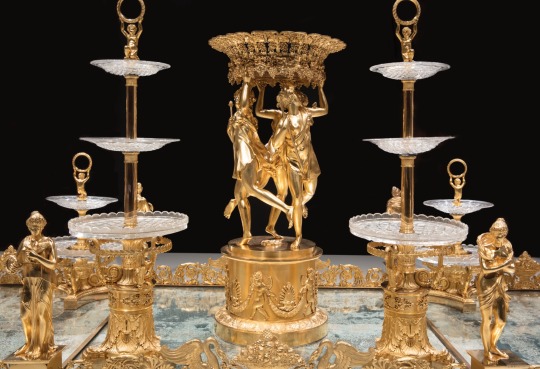
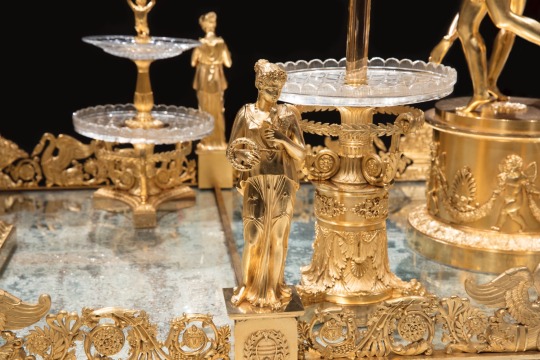
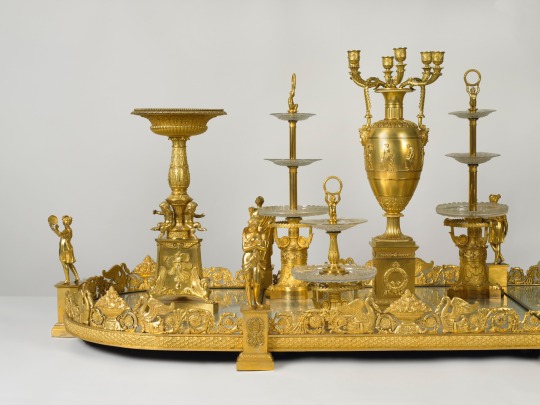




Surtout de Table (Table centerpiece) Pierre-Philippe Thomire, ca. 1810
Stated to have been a present from Napoleon to his stepson Eugène de Beauharnais, possibly at the time of the latter's wedding, a surtout de table by Thomire appears in the inventory of Eugène's possessions he shipped to Munich after the fall of Napoleon. Thomire produced this large, complex work meant to dazzle with reflected light and candlelight while including classical references that would have been recognized by the important heads of state.
The motifs including swans—popular with Eugène's mother, Josephine—appear in Eugène's house called the Hôtel Beauharnais, suggesting the surtout de table might have been intended for use there. It undoubtedly accompanied Eugène when Napoleon appointed him viceroy of Italy.
Pierre-Philippe Thomire, the designer and maker of this gilt-bronze work, became “Gilt bronze maker to the Emperor” in 1809. He is responsible for several similar examples made for Napoleon to give to his mother, sisters, and a few of his marshals. Recent examinations of Eugène’s inventories have revealed more than one surtout among his possessions.
Source: Cooper Hewitt, SURTOUT DE TABLE: SUSTENANCE OF POLITICAL POWER by Sarah D. Coffin
#Surtout de Table#Table centerpiece#Pierre-Philippe Thomire#thomire#Napoleon#napoleon bonaparte#eg#Eugène de Beauharnais#eugene#napoleonic era#19th century#napoleonic#empire#first french empire#French empire#premier empire#1st empire#Munich#France#Germany#French#history#1800s#classical#artifact#Italy#home interior#interior design#decoration#etiquette
48 notes
·
View notes
Text
AMÉLIE OF LEUCHTENBERG
Empress Consort of Brazil
(born 1812 - died 1873)
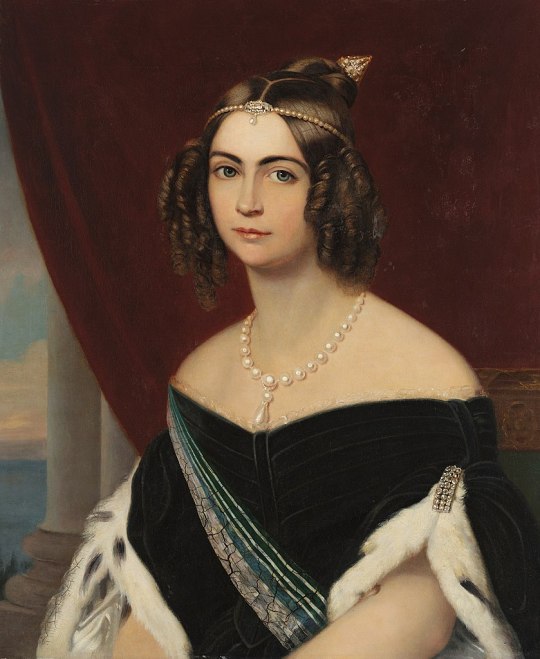
pictured above is a portrait of the Duchess of Braganza, by Friedrich Dürk from the 1830s
-------------------- ~ -------------------- ~ --------------------
SERIES - On this day July Edition: Amélie was born on 31 July 1812.
-------------------- ~ -------------------- ~ --------------------
AMÉLIE AUGUSTE EUGÉNIE was born on 31 July 1812 in Milan, the capital of the Kingdom of Italy under French control. She was one of the daughters of Eugène of Beauharnais, Viceroy of Italy and Princess Auguste of Bavaria, and thus was a member of the HOUSE OF BEAUHARNAIS.
At the time of her birth her family was living in Milan because her father was serving as Viceroy of Italy for his stepfather Napoléon I, Emperor of the French and King of Italy.
They lived in Milan until the Emperor's fall in 1814 and then moved to Munich where her grandfather Maximilian I Joseph, King of Bavaria created her father as Duke of Leuchtenberg. After which she became know as PRINCESS AMÉLIE OF LEUCHTENBERG.
In 1829 she married the widower PEDRO DE ALCÂNTARA FRANCISCO ANTÓNIO JOÃO CARLOS XAVIER DE PAULA MIGUEL RAFAEL JOAQUIM JOSÉ GONZAGA PASCOAL CIPRIANO SERAFIM. He was PEDRO I, the Emperor of Brazil, to where she moved and lived briefly as EMPRESS CONSORT OF BRAZIL, and was the eldest son of João VI, King of Portugal and Infanta Carlota Joaquina of Spain. He had seven children with his late wife Archduchess Maria Leopoldine of Austria and many other illegitimate children.
Before her wedding, her husband had also briefly reigned as King Pedro IV of Portugal in 1826 but had abdicated the Portuguese throne to his eldest daughter Maria da Glória, Princess of Grão-Pará, who became Queen Maria I. However her brother-in-law Infante Miguel usurped her stepdaughter's throne and reigned as Miguel I, King of Portugal from 1828.
So her husband decided to return to Portugal in 1831 to fight the usurper King and also abdicated the Brazilian throne to his son Pedro, Prince Imperial, who succeeded as Emperor Pedro II.
After the second abdication her husband assumed the title of Duke of Braganza, and she became the DUCHESS OF BRAGANZA. At that time she was already pregnant and they soon sailed from Brazil to Europe.
While her husband fought in Portugal she lived in Paris with two of her stepdaughters Maria da Glória, now the Princess Imperial of Brazil and her husband's illegitimante daughter Isabel Maria de Alcântara, Duchess of Goiás. There she gave birth to her only child.
By May 1834 her husband forced his brother to abdicate and her stepdaughter returned to her rightfull throne.
Following this event she went to live in Lisbon with her husband and young daughter. However a couple of months later her husband fell ill by October 1834 he was already dead.
As a widow she became known as the DOWAGER DUCHESS OF BRAGANZA. She was only 22 years old and decided to stay in Portugal with her daughter and stepdaughter, who ended up briefly married to her brother Auguste, Duke of Leuchtenberg.
However over the years she struggled to get support and recognition for her daughter from the Brazilian Regency Council, at least until her stepson took the power for himself.
She never remarried and lived in Portugal for the rest of her life. Her daughter predeceased her, dying aged 21, while the Dowager Duchess of Braganza died aged 60, in Lisbon, in 1873.
-------------------- ~ -------------------- ~ --------------------
AMÉLIE and her husband PEDRO I had one child...
Princess Maria Amélia of Brazil - unmarried.
#amelie of leuchtenberg#amelie de beauharnais#empress of brazil#imperatriz amelia#imperatriz do brasil#beauharnais#house of beauharnais#empire of brazil#imperio do brasil#brasil imperial#french royals#french royalty#german royals#german royalty#royals#royalty#monarchy#monarchies#royal history#french history#german history#european history#world history#history#history lover#19th century#familia imperial#dom pedro i#napoleon bonaparte#history with laura
26 notes
·
View notes
Photo

Apartments of Napoleon III at the Louvre
#napoleon iii#house of talleyrand-périgord#bastard son of hortense de beauharnais and charles joseph de flahaut#bâtard de bonaparte#emperor of the french#musée du louvre#second french empire#house of beauharnais#house of bonaparte#rococo#interior#decor#baroque#19th century#french imperial family
52 notes
·
View notes